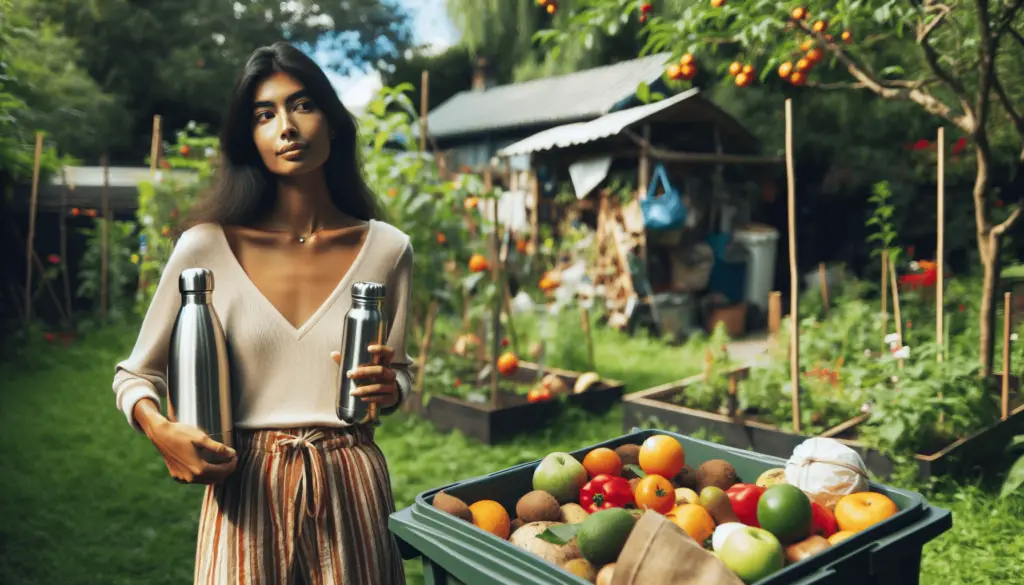Are you interested in reducing waste and living a more sustainable lifestyle? Have you ever considered adopting a prepper’s approach to zero-waste living? Let’s explore how you can combine the principles of prepping with zero-waste living to create a more eco-friendly and self-sufficient lifestyle.

Understanding Zero-Waste Living
Zero-waste living is a lifestyle focused on minimizing waste and reducing your environmental impact. This involves limiting the amount of waste you produce, recycling and composting as much as possible, and avoiding single-use plastics and disposable items. By embracing zero-waste living, you can significantly reduce your carbon footprint and contribute to a healthier planet for future generations.
What does zero-waste living look like?
Zero-waste living involves making conscious choices to reduce your waste output in all areas of your life – from groceries and household products to personal care items and clothing. This means using reusable items whenever possible, buying in bulk to reduce packaging waste, and choosing products with minimal or recyclable packaging.
The Prepper’s Mindset
Preppers are individuals who prepare for emergencies and disasters by stockpiling essential supplies, developing survival skills, and creating contingency plans. While prepping is often associated with extreme scenarios like natural disasters or economic collapse, the principles of preparedness can also be applied to everyday living to reduce waste and promote self-sufficiency.
How can prepping principles benefit zero-waste living?
By adopting a prepper’s mindset, you can become more mindful of your consumption habits and focus on being prepared for any situation. This can translate into purchasing durable, long-lasting goods, growing your own food, and learning practical skills like sewing, repair, and upcycling. By being proactive and resourceful, you can reduce waste and live more sustainably in your daily life.
Building a Zero-Waste Pantry
One way to reduce waste in your household is by maintaining a zero-waste pantry stocked with bulk foods, reusable containers, and homemade staples. By planning ahead and buying in bulk, you can minimize packaging waste and have a constant supply of essentials on hand.
What are essential items for a zero-waste pantry?
- Bulk grains, legumes, and nuts
- Spices and herbs in reusable containers
- Homemade condiments and sauces
- Reusable storage containers and jars
Stocking your pantry with these essentials not only reduces waste but also encourages healthier eating habits and creative cooking. By preparing your own staples like bread, yogurt, and granola, you can avoid single-use packaging and control the quality of ingredients in your meals.
Practical Tips for Zero-Waste Living
Transitioning to a zero-waste lifestyle may seem overwhelming at first, but with some practical tips and tricks, you can gradually reduce your waste output and make more sustainable choices in your daily life.
How can you start living a zero-waste lifestyle?
- Begin by assessing your current waste habits and setting achievable goals for reducing waste.
- Invest in reusable items such as water bottles, shopping bags, and food containers.
- Opt for products with minimal or recyclable packaging, and support businesses that prioritize sustainability.
- Get involved in your community by participating in local clean-up events, composting programs, or zero-waste initiatives.
By taking small steps towards zero-waste living, you can make a positive impact on the environment and inspire others to do the same. Remember that progress is more important than perfection, and every effort towards reducing waste counts towards a cleaner, greener future.

Embracing Minimalism in Prepping
Minimalism is a lifestyle philosophy that emphasizes simplicity, decluttering, and mindfulness in consumption. By incorporating minimalist principles into your prepping strategy, you can streamline your emergency preparations, reduce unnecessary items, and focus on quality over quantity.
How can minimalism enhance your prepping efforts?
- Evaluate your prepping supplies and focus on essentials that serve multiple purposes.
- Declutter your storage spaces and organize supplies for easy access in emergencies.
- Avoid unnecessary gadgets and gear that add clutter and complexity to your prepping plans.
- Embrace DIY solutions and learn practical skills for self-reliance in various scenarios.
By embracing minimalism in your prepping approach, you can optimize your resources, reduce waste, and create a more efficient and sustainable emergency preparedness system. Simplifying your prepping strategy can lead to more effective outcomes and a sense of peace and readiness for whatever challenges may arise.
Recycling and Upcycling in Prepping
Recycling and upcycling are essential practices in zero-waste living that can also be applied to prepping for emergencies. By repurposing materials, reusing items in creative ways, and recycling waste products, you can extend the lifespan of resources, reduce environmental impact, and save money in the long run.
How can recycling and upcycling benefit your prepping efforts?
- Repurpose household items for emergency supplies, such as using old containers for water storage or creating makeshift shelters from recycled materials.
- Reuse packaging materials like cardboard boxes, bubble wrap, and packing peanuts for organizing and protecting prepping supplies.
- Recycle waste products like paper, plastic, and metal to minimize landfill waste and conserve resources for future use.
- Upcycle clothing, furniture, and tools to give them new life and functionality in emergency scenarios.
By incorporating recycling and upcycling practices into your prepping routine, you can reduce waste, save money on new purchases, and increase the overall sustainability of your emergency preparedness plans. Thinking creatively and resourcefully can turn everyday items into valuable assets in times of need.
Conclusion
By adopting a prepper’s approach to zero-waste living, you can combine the principles of preparedness with sustainability to create a more eco-friendly, self-sufficient lifestyle. From building a zero-waste pantry to embracing minimalism in prepping, there are many ways to reduce waste, conserve resources, and be better prepared for emergencies. Remember that every small step towards zero-waste living counts towards a cleaner, greener future for yourself and the planet. So, are you ready to take on the challenge of integrating prepping with zero-waste living in your daily life? The choice is yours.
